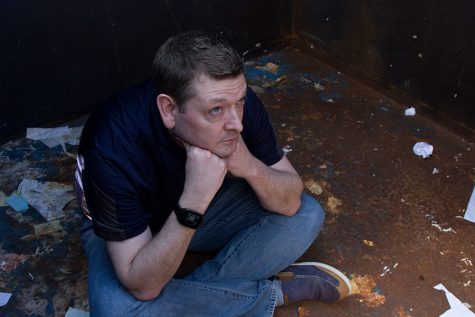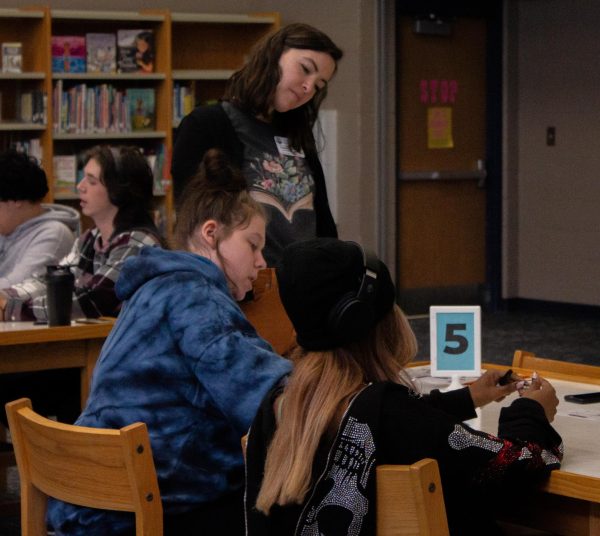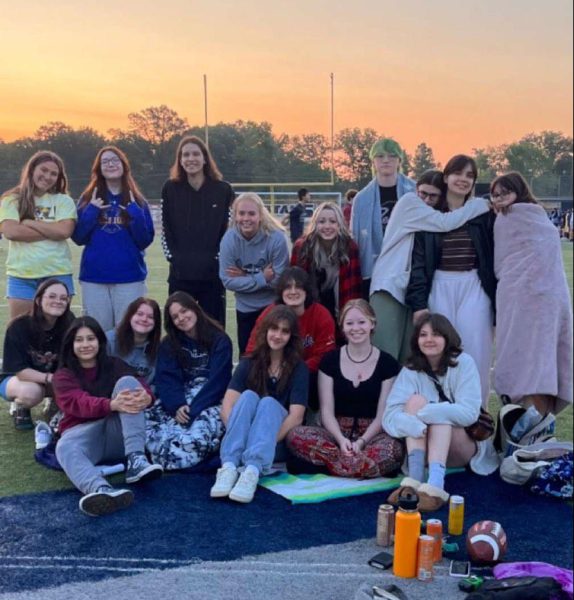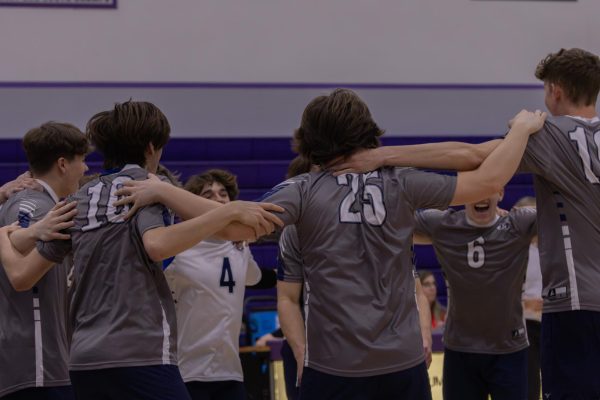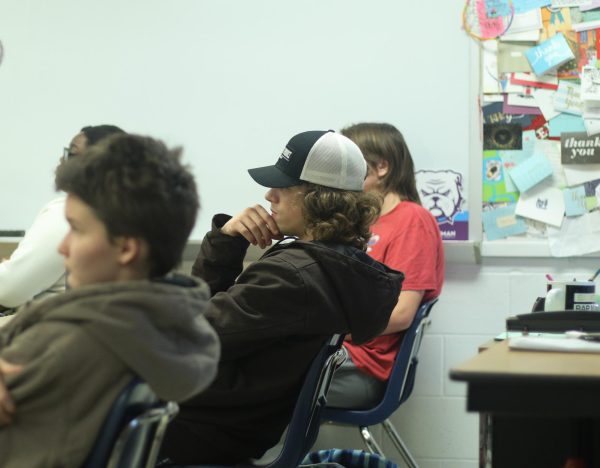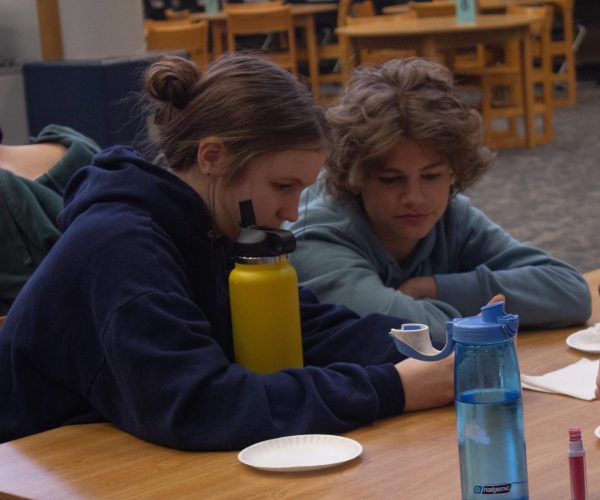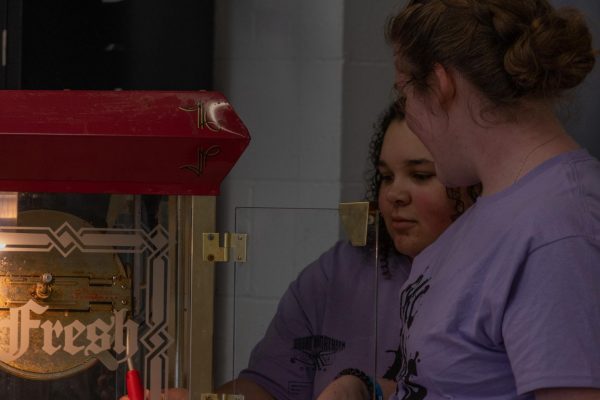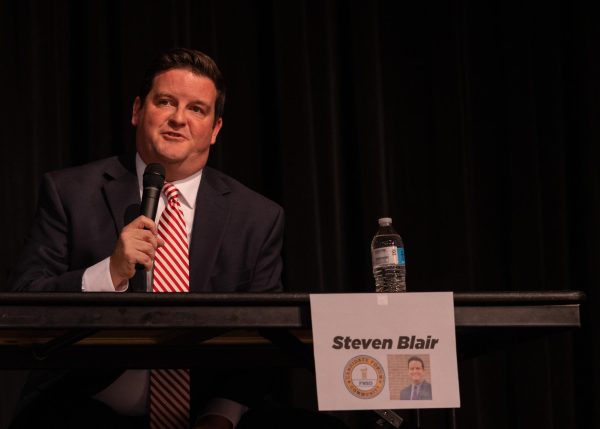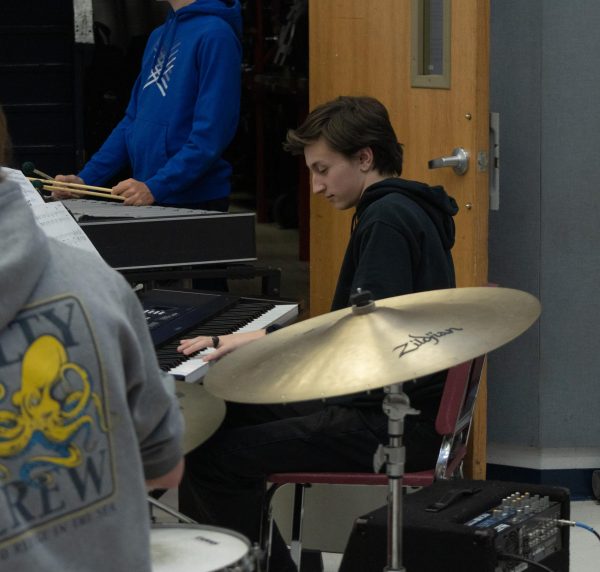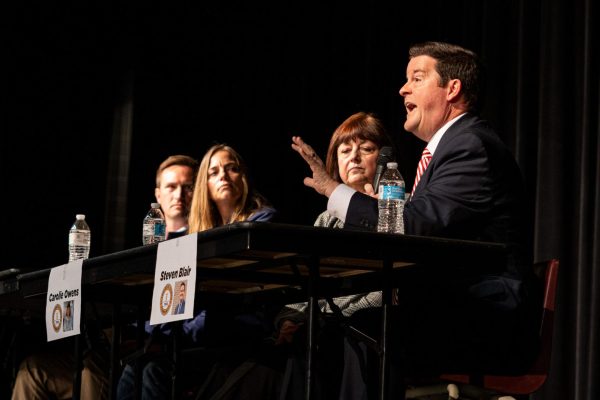Cracks in the system
How Proposition Learn failed, the effects, and the state of the District in years to come
FHC biology and zoology/botany teacher Mr. Reed gazes out from within a garbage dumpster. Left even without cost-of-living adjustments for the past couple of years, teachers are quickly losing morale in a system that continues to demand utmost quality.
When the doors to polling stations finally closed at 7 p.m. on the evening of April 3, the news was immediately apparent. After over one month of intense campaigning, counter-campaigning, and months of strategic planning prior, the Francis Howell School District’s major tax/spending legislation – Proposition Learn – had failed. Voted down with a simple majority of 51.59%, the proposal was to be the district’s first funding increase in 14 years, and had been the third failed proposal in three.
Met with intense and widely varying emotions from teachers, administrators, students, and constituent taxpayers, the reasons as to why the FHSD has struggled so significantly with passing a tax levy are still ambiguous to many. Many in the community believe the district is mismanaged; many believe it’s running on fumes.
Public schools across the nation are funded through a variety of federal, state, and local sources, and property tax revenue from the community is one of the biggest streams—56 percent. Proposition Learn represented a 46-cent increase in the property taxes paid per-dollar of assessed value, approximately 15 dollars more per month in a home valued at $200,000. It would have allowed the district to restore resources that have been cut over the past eight years, including paraprofessionals and psychologists, and pursue plans that have been in the books for even longer, like a full overhaul of technology-based resources, as well as the curriculums surrounding them.
To understand why every proposal in the past 14 years has been shut down, one has to return to the aftermath of Proposition Howell, two years ago.
Cracks Forming
Since the passage of a large tax levy in 2004, the district remained financially stable, and growing. Purchases of new technology were at an all time high. And yet, come autumn 2014, without any additional funding, gaps began to form between money coming in and out. Proposition Y was introduced in 2015, but failed handedly when voters viewed the attempt as a sneak-by tax increase. Proposition Howell, on the November 2016 general election ballot, carried the major hope of the district for new funding.
On the forefront of solving the impending financial emergency was Mr. Kevin Supple, FHSD Chief Operations Officer, and Chairperson of the Finance and Operations Committee.
“The district had, for many years, been able to have a balanced budget, and so when we got to fiscal year ‘15, we started to see that picture shift,” Mr. Supple said. “An emphasis [of] Proposition Howell was to provide additional revenue so we didn’t have an excess of expenditures over revenue.”
Regardless of the need, however, the local community rejected Prop. Howell by a close tie, throwing the district into disarray, and calling into question what could have been done to change the final outcome.
“An advantage that may have turned out to be a disadvantage was that Proposition Howell was on the November 2016 ballot, so it was among a series of things, including a presidential election, that needed to be voted on,” Mr. Supple said. “There was an enormous voter turnout for that election; we had to cast our net very broadly to reach a very broad constituency.”
Voting overwhelmingly for President Trump, the community turnout reflected the same partisanship in Prop. Howell.
“We were hopeful that the larger community turnout would work in our favor, perhaps not necessarily as a result of anything we did or didn’t do, but of the changing political climate in the country,” Mr. Supple said. “There was a much more conservative outcome than we might have been able to anticipate.”
In the aftermath of Prop. Howell’s failure, the district’s financial planning team finally sat down to make enormous cuts to the overall budget in order to bring it back into a balanced state. The equivalency of over 250 full-time positions was cut. An “Activities Fee” of $40 was introduced at the start of this school year.
“We subsequently made some reducations to our expenditures in order to bring revenue and expense closer into line, so we currently have a balanced budget, as a result of those changes that were made,” Mr. Supple said.
The result was a budget that was balanced, but weakened.
Educators like FHC Teachers’ Union Representative and FACS teacher Mrs. Grace Clifford were shocked by the outcome, but believed improvements were made in prospect for the next attempt, Proposition Learn.
“I know on the night of the election, I thought it was going to pass,” Clifford said. “But when you look at how much further we’ve come in educating the public since then, we’ve really taken the education level so much higher.”
New efforts dashed
One of the most fundamental aspects of local politics involves the simple fact that few actually care about it. Local elections and ballots have the lowest turnouts out of any type of election, and as such, for a school district to pass funding legislation it is essential to educate the public. According to Mrs. Clifford, with Prop. Learn, the district employed new tactics.
“What we did with Prop L. that was a little different was that we specifically targeted families in the schools that had previously voted in the past election, in November,” Mrs. Clifford said. “It [helped] so much just to help people understand what the frequently asked questions were.”
However, even with a greater emphasis on directed, specific community education, the “No” advocacy group pushed back hard. Their use of signs simply broadcasting a “10 percent tax increase” was contentious to many.
“I think it’s a fair statement; if you think about our current levy, four dollars and 85 cents, then 46 cents would be approximately a ten-percent tax increase….to property taxes. I think we all know that the tagline doesn’t tell the whole story,” Mr. Supple said. “You have to remember that the increase is going to be used over a span of time. It’s important to realize that, yes, it’s a ten percent property tax rate increase, but that’s to fund us for the next ten years. It’s been 14 years since we’ve had an increase.”
Regardless, at the polls, Mr. Supple heard numerous conflicting reasons as to why the community was shutting down Prop. Learn.
“We’ve made a very concerted effort to alert the community of what our needs are, but I believe that there are a number of misconceptions that continue to persist despite our best efforts to educate people,” Mr. Supple said. “I had a gentlemen tell me that we spent too much money advertising this to the community, and he thought that was wasteful, so that’s why he was voting no. I had another gentlemen tell me we didn’t spend enough money to educate the community about this, we were trying to sneak it by, and that’s why he was voting no. Well, I don’t know how both of those things can be true.”
He continued.
“I had one gentleman tell me, ‘Look at your performance; your academic performance as a school district is very high. You don’t need the money.’ I had another gentleman tell me, ‘Look at your performance, you’re not the highest scoring school district, so you’re not using your money properly.’ How do you bridge those communication gaps?” he said. “If we were consistently hearing one message – ‘You get this wrong, you’re not doing enough of this’ – it would be less of a problem. But when there are those conflicting messages, I don’t know how to bridge those gaps. It’s very difficult.”
Mrs. Clifford believes the misconceptions, as a result of faulty community education, continue to hamper progress.
“I read several Facebook posts afterward from people who voted it down, and they were talking about how there wasn’t much transparency. So I went to BoardDocs, and you can go look how every check is spent on BoardDocs,” she said.
By the day’s end, Proposition Learn, the lowest tax levy the district has ever proposed, failed by approximately 500 votes. The repercussions will not be immediately apparent, but the district’s future, as of now, is bleak. According to Mr. Supple and the Board of Education, the district is expected to feel immense strain in technological funding, teacher/faculty pay, and support for students with emotional needs.
Aftermath
In a situation where costs are increasing but funds are unchanging, cuts need to be made. One of the most immediate effects of the financial shortage will be the continued use of old technology long-past its expiration date. AP Chemistry student JD Salser, junior, feels the impacts in his high-level science courses.
“I think the equipment we have, especially in a lot of our science labs, is outdated,” Salser said. “Nothing is especially broken, but we could definitely go into more depth with our topics if we had more funding for our laboratories.”
Mrs. Clifford concurred.
“Every curriculum that has been written in the last three years, which is a large amount of curriculum, stressed using technology, to the point where we’re not replacing textbooks. In the district, we were the first building to have SMART Boards. We started [that] revolution, way back then, but now some of those boards are starting to push 20 years,” she said. “They were never designed to last that long. I’m on my third projector, and I was one of the last ones to get one. I have a set of computers in my classroom that were bought 14 years ago, and I look at them at this point as nice foldable paperweights.”
Without adequate funding for updated technology, opportunities in the entire STEM (Science, Technology, Engineering, Math) field will be stifled. These opportunities, Mr. Supple believes, are crucial in the rapidly modernizing world. They are present in high schools, but sparsely otherwise.
“Proposition Learn would have allowed us to provide more opportunities for elementary kids to get involved in basic skills that might lead them into one of the STEM careers. Kids are going to have to,” Mr. Supple said. “Younger kids have language acquisition skills that far outstrip older kids—why aren’t we teaching our younger kids how to code? It involves a revamping of our curriculum, maybe a redirection of some resources, and some additional resources, but those are the things that we wanted to focus on [with Proposition Learn].”
The district, in the footsteps of the most modern schools across the nation, and at the calling of the President, wants to attempt to incentivize career-ready STEM training based on powerful new Industry-Recognizing Credentials (IRCs).
“If you graduate high school with a particular skill set, you can immediately be put to work,” Mr. Supple said. “Think about a kid graduating as a certified Microsoft engineer, it’s not outside the realm of possibility. They will walk into a $60-70,000 per year job at 18, 19 years old. Why aren’t we doing that? That’s what we need to do, and that’s what the business community told us we need to do. Jobs remain unfilled not because there aren’t people, but because there aren’t people with the requisite skills.”
In his day-to-day student life, Salser also considers simple technological access and efficacy as important to his education as well. 2016 data from St. Charles County found that the FHSD, of the seven districts in the area, spends the second-least on technology per-student ($150), only just ahead of Fort Zumwalt by $25. Orchard Farms, the leading district, spends nearly $550 per student.

“I think the investment is a very safe one, and that it’s necessary to be able to evolve as a society and community. I see a lot of other schools with more funding who are able to give their students laptops in order to do assignments [at home],” Salser said. “You’re seeing a shift where we’re starting to use Google Classroom and Google Docs and Google Slides and that’s where a higher level of education is really going. If we’re not able to keep up with the best technology, the level of education is going to decline.”
Yet, with or without modern technology, teachers are always present—constant bastions of the opportunity for a quality education.
Across the United States, teachers are paid notoriously low in comparison to other developed nations. According to 2016 data from the Bureau of Labor Statistics, there are only six states that pay teachers less than they are in Missouri. The lowest-paying states, Oklahoma and West Virginia, have already experienced massive teacher strikes in response. With the failure of Proposition Learn, long-standing salary freezes will stay in place, especially impacting younger, newer teachers.
“It has an effect on the morale. With this one not passing, a lot of people lost the feeling of being appreciated. I think some of our younger ones are becoming [demoralized], because their pay has been so static, even some in the middle,” Mrs. Clifford said. “When you’ve got a group who’s just got married, just had kids, and their pay is not advancing, and the stuff they have to do is advancing … I can see where they’re really stressed out.”
Salser sees the constant stress in the teachers he’s closest with.
“I can definitely see the emotional stress that it’s putting on some of my teachers. After getting to know some of my teachers on more of a personal level, I can see them struggling with things like bills that they have to pay, or that they’re not going to be able to make ends meet,” he said. “I see them pouring their entire lives into my fellow students and I, and it’s hard to see, because I know a lot of teachers have to work a second job over the summer or during school, and that’s taking away from our education.”
“Teachers’ working conditions are students’ learning conditions,” Mrs. Clifford added. “You have to realize, at that point with your pay, when the other new things that you have to do come in, those things become the stressors. We deflect it onto the other stuff; I see that happening a lot.”
While many negation voters believed the Proposition would be to give teachers more raises, the picture is bleaker. To balance the budget, the district has been struggling to provide cost of living adjustments to faculty members at nearly all schools. Teachers, new and old, without adequate technology, are to be expected to provide the same quality of education for less pay.
“I don’t know how anybody does it with kids,” Mrs. Clifford said. “You’re looking at just balancing the bills.”
Of the impacts, however, which also include a continuation and/or increase of the Activities Fee as well as a potential discontinuation of freshman-level sports, the most profound will not be visible. The district’s background support structure for teachers and emotionally distressed students will continue to erode without adequate funding for counselors and paraprofessionals; their funding was of the first places where cuts were made.
“It’s the additional supports behind the classrooms that have been taken away. Those don’t get counted in the student-teacher ratios that get calculated, so people take a look at the numbers and say, ‘Nothing has changed.’ That’s not true,” Mr. Supple said. “We have reduced the number of paraprofessionals who support our teachers. Those teacher assistants can break the classroom into groups so the teacher can work and focus on the students with skill deficits, while the paraprofessionals keep the other kids meaningfully engaged. We’re not doing as much of that, and I think doing things like that are what helped drive us to be a good school district.”
In addition to paraprofessionals, especially at the elementary level, support for the growing number of kids who come to school with emotional distress has been evaporating.
“There are more students, particularly at the elementary level, who come to school with severe social-emotional needs,” he said. “Some of those are acute, ‘My parents got in a fight last night, and I didn’t get to sleep,’ or, “I’m upset about whether or not my parents are going to get divorced, and I can’t focus in the classroom as a result.’” Some are more chronic, where they say, ‘My parents aren’t supportive of me,’ or, ‘My Dad’s hitting all the kids sometimes and I’m in fear all the time and when I come to school; I’m scared.’ More and more kids are coming to school who need those additional supports. We know we’ve got a greater need for that.”
Supple continued.
“Proposition Learn would have helped us provide those additional supports at the middle and elementary school level for students with those needs. That’s a growing area of concern,” he said. “We are starving the system of the resources necessary to continue to be excellent. Can we continue to graduate kids….absolutely. But some of the resources that have really helped us be excellent are not there anymore.”
The district remains committed to placing another proposition on the local ballot next year, as the “No” advocacy group remains similarly committed to keeping property tax contributions where they are now. Administrators, teachers, and students are scrambling to improve chances on the next attempt to secure school funding.
Lasting resolve
By the day’s end, the Proposition failed by a tiny margin—500, from a base composed of tens of thousands of voters. It is the closest margin the district has ever had, perhaps showing an increasing trend, but serious concerns still exist in providing better community education, as well as voter incentivization. According to Salser, at the high schools, the political activism was low at best.
“I don’t think it’s necessarily that so many people people voted against it, but that people stayed home,” Salser said. “With a margin like 500 votes, I just didn’t see much political activism in the student body, especially with seniors who are now voting. I don’t see people going out to the polls or talking about it, and I think a few political activists in the senior class could get out and change the numbers around.”
Mrs. Clifford agreed.
“That’s a good place that we could start looking at more — starting to look and help get our local students out to vote,” she said. “You have to be real careful, though; teachers have to be more careful about how they do that. If I could pick one thing that really hurt us, it was spring break. To be gone for ten days prior to the vote….we didn’t have as many people who could go out and actively vote during those times, because people were on vacation.”
For those who did vote, the suggestions to the district afterward were confusing to many. There exists a lasting sentiment that the road to a better financial situation is not through expanded funding, but simply through the cutting of all unnecessary resources. Problems, arise, however, when suggested cuts misunderstand what exactly is “unnecessary.”
“I received an email from a gentlemen on Wednesday that explained some things that we could do immediately to save money. I quote, ‘I see that you have 58 principals, so I think you should cut six of them, and with the average salary of X, you’ll save X much money.’ That’s a very easy statement to make,” Mr. Supple said. “I don’t know that it’s a justified criticism, or a reasonable suggestion, that we should just willy-nilly cut six principals because that will save us some money.
He continued.
“At Francis Howell Central, you have 1800 kids, a number of principals, and an Activities Director, and there are some very specific responsibilities those individuals have to have that help to move the educational process forward,” he said. “I think that some of the suggestions about mismanagement come from a lack of understanding of what it is that we’re doing within schools in 2018. They’re making a judgement based on their own experiences, 30 years removed from actually being in school, and they don’t understand the reality of today’s educational environment.”
Moreover, Mr. Supple believes the conflicting messages behind individuals’ reasons for not voting perhaps show an underlying trend. Not only are constituents of the community resistant to any tax increases, but they have been consistently losing faith in the public school system.
“I think for people who are frustrated with ‘government’ in general, they perceive there’s a great deal of waste within government, and school districts are seen as an extension of that. This is an opportunity for them to exercise their authority over what happens,” he said. “If you take a look at the national press, where the current Secretary of Education is pressing for more privatization of schools, and the message is constantly repeated that ‘public schools are failing,’ people lose confidence in the work that we’re doing.”
For him, the purpose of public schools like Francis Howell Central goes back to the individuals who established the United States.
“The founders of our country felt so strongly about public education that they created the basis of what we have today, which is the greatest public education system that exists in the world. There are other countries that have good systems, and we’re often compared to those countries. But they don’t educate every kid that comes in the door. You are slated very early on in your career, as early as kindergarten or first grade, as to whether you have the opportunity to progress all the way through high school and college [there],” he said. “We educate every kid who comes to us. On the whole, the public schools are the ones who have produced some of the greatest minds who have significantly changed and forever improved our lives. I think they’re the foundation of our Republic. But [that] confidence is being constantly eroded by people in positions of power drumming on the message that ‘public schools are failing.’”
With the growing ideological criticism against public schools and the continued failures of funding-support legislation over the past years, Salser feels determined to push back, despite the existing challenges.
“It’s really hard to watch that happen, especially in a fairly nice area like the one we live in. At first, it makes you feel hopeless, [like] nothing’s going to really ever change,” Salser said. “But in the end, it just makes me want to fight harder next time to get the next proposition passed. It makes me want to become more of a political activist when I’m able to vote.”
Your donation will support the student journalists of Francis Howell Central High School. Your contribution will allow us to purchase equipment and cover our annual website hosting costs. FHCToday.com and our subsequent publications are dedicated to the students by the students. We hope you consider donating to allow us to continue our mission of a connected and well-informed student body.




